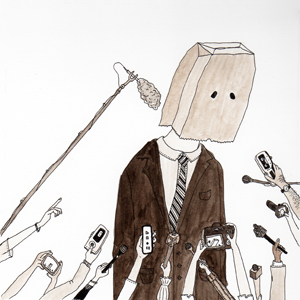The Booted Minister Who Became a Great Chief
Frank Calder's legacy far eclipsed a night in jail. Latest of 'Some Honourable Members.'
![]()

Illustration by Jessie Donaldson.
![]()
Illustration by Jessie Donaldson.
[Editor's note: This is the fifteenth in our "Some Honourable Members" series, depicting the more dubious moments in B.C.'s political history, brought to you by veteran muckrakers Tom Barrett and Tom Hawthorn, one a day until election day.]
Around 5 a.m. one April morning in 1973, Victoria police came across a car stopped in an intersection a few blocks from the legislature.
The female driver and her male companion were both drunk. The cops took them to the station and locked them up for the rest of the night. The woman paid a fine; the man was not charged.
A fairly routine event except that the man was Frank Calder, the first aboriginal cabinet minister in Canadian history. He was about to become the first aboriginal kicked out of a cabinet in Canadian history.
Rumours of Calder's night in jail circulated slowly around Victoria. When then-premier Dave Barrett heard the stories, he phoned Calder at home in northern B.C. In their history of the Barrett years, The Art of the Impossible, Geoff Meggs and Rod Mickleburgh recount one of the more unusual conversations between a premier and a minister of the Crown:
Barrett: "Frank, were you arrested in a car with a woman in the middle of an intersection and were both of you inebriated?"
Calder: "No. That did not happen."
Barrett then phoned the Victoria police chief. Yes, he said, that did happen. When Calder got back to the capital, Barrett fired him. When he announced the dismissal to the media, Barrett refused to give a reason beyond "I've lost confidence in him as a cabinet minister."
Calder revealed the rest of the story, insisting "this is not Watergate." Said Calder: "This is not a criminal act. It didn't involve public funds. As a matter of fact, I paid for my girlfriend's fine, so what the hell are they worried about?"
Barrett has always maintained that he booted Calder because he denied the incident and not because of the incident itself. Others have wondered whether a non-First Nations minister would have been treated the same way.
There was also the question of Calder's close ties to Barrett's bitter New Democrat rival Tom Berger, a lawyer who handled what became known as the Calder case. As president of the Nisga'a Tribal Council, Calder spent years pushing his people's land claims through the courts in opposition to both Social Credit and NDP provincial governments. A few months before Calder's dismissal, he and Berger scored a landmark victory before the Supreme Court of Canada that would lead to the first modern First Nations treaty in B.C.
Did any of that influence Barrett's decision?
In the long run, the incident did nothing to harm Calder's reputation. He abandoned the NDP in 1975 to run successfully for Social Credit, losing his seat by a single vote -- 750 to 749 -- in 1979.
In 1988, Calder was named an officer of the Order of Canada. In 2004, he received the Order of B.C. In 2005, the Globe and Mail named him one of the greatest British Columbians of all time. When he died a year later, aged 91, the Victoria Times-Colonist wrote that, "thanks to Frank Calder, 'Chief of Chiefs' of the Nisga'a people, British Columbia is a different -- and better -- place."



What have we missed? What do you think? We want to know. Comment below. Keep in mind:
Do:
Do not: